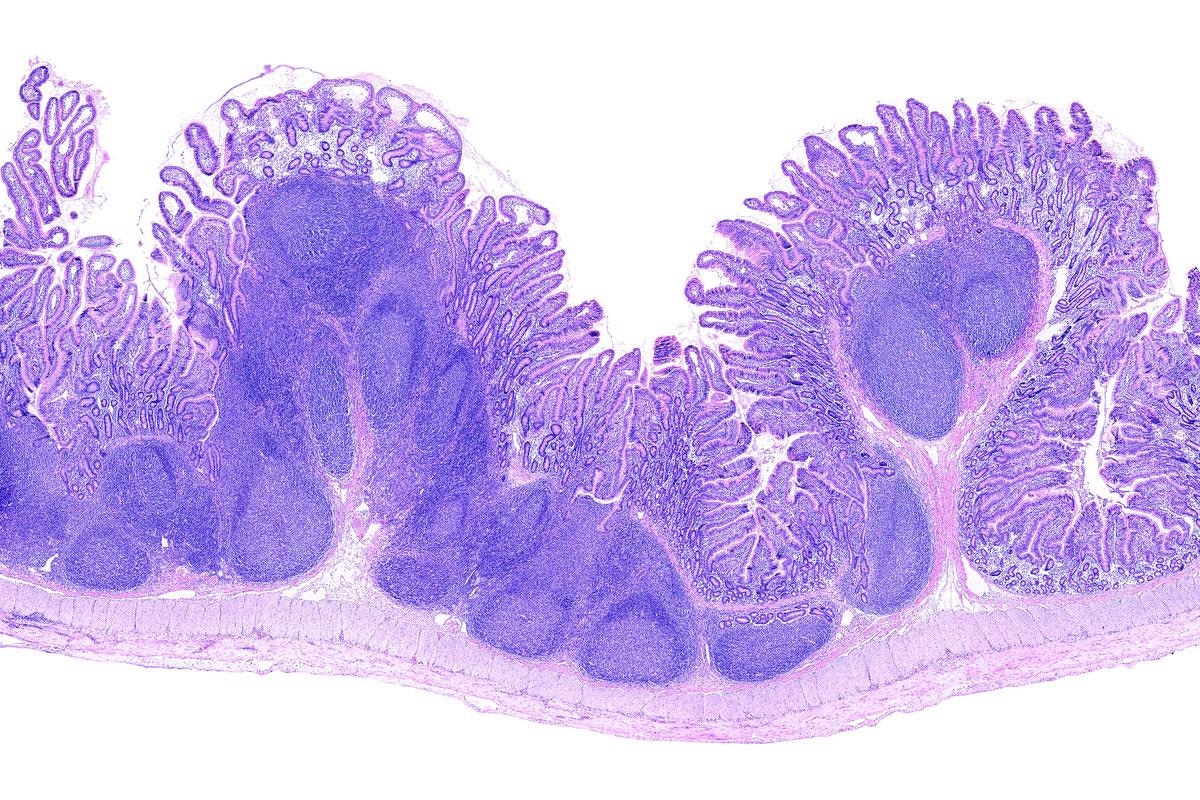A team of scientists from the UK has recently demonstrated that severe coronavirus disease 2019 (COVID-19) is associated with pronounced changes in the ileal Peyer’s Patches, which could be responsible for the suppression of intestinal immune responses and subsequent disruption of microbiota homeostasis in the gastrointestinal (GI) tract.

Study: Disrupted Peyer's patch microanatomy in COVID-19 including germinal centre atrophy independent of local virus. Image Credit: Jose Luis Calvo/Shutterstock

 This news article was a review of a preliminary scientific report that had not undergone peer-review at the time of publication. Since its initial publication, the scientific report has now been peer reviewed and accepted for publication in a Scientific Journal. Links to the preliminary and peer-reviewed reports are available in the Sources section at the bottom of this article. View Sources
This news article was a review of a preliminary scientific report that had not undergone peer-review at the time of publication. Since its initial publication, the scientific report has now been peer reviewed and accepted for publication in a Scientific Journal. Links to the preliminary and peer-reviewed reports are available in the Sources section at the bottom of this article. View Sources
The study is currently available on the bioRxiv* preprint server, whilst the article undergoes peer review
Background
In viral infections, presence of viruses in the GI tract is known to support long-lived antibody responses that are vital for inhibiting viral propagation. An absence of such response has been found to associate with persistent disease. In about 12% of COVID-19 patients, GI symptoms including diarrhea and vomiting have been observed, indicating the propagation of severe acute respiratory syndrome coronavirus 2 (SARS-CoV-2) infection in the GI tract epithelial cells.
In the GI tract, immune responses originate in the lymphoid tissues that produce activated B and T cells. The clusters of gut-associated lymphoid tissues in the terminal ileum are called Peyer’s patches, which contain antigen-specific germinal centers. Antibodies secreted in response to germinal centers play vital roles in regulating the gut microbiota and maintaining homeostasis.
In the current study, the scientists have analyzed GI tract samples collected from deceased COVID-19 patients to localize SARS-CoV-2 and quantify viral RNA. In addition, they have conducted immunohistochemistry and imaging mass cytometry to analyze structural and functional characteristics of ileal Peyer’s patches.
Important observations
The localization and quantification of SARS-CoV-2 were conducted using samples from theesophagus, stomach, duodenum, ileum, colon, lungs, and spleen. The findings revealed that in severe infection, SARS-CoV-2 is localized throughout the GI tract, with the highest localization in the epithelium and subepithelial lamina propria. However, no presence of the virus was observed in the lymphoid tissues.
Structural and functional characterization of Peyer’s patches
The characterization of ileum Peyer’s patches was conducted by double staining the receptors expressed by B and T cells on the lymphoid tissues. In addition, the germinal center was stained. The findings revealed that compared to control tissues, the ileum Payer’s patches isolated from COVID-19 patients have significantly reduced germinal centers irrespective of the levels of viral RNA.
The immunohistochemistry and imaging mass cytometry analysis was conducted on cells specifically isolated from the lymphoid tissues in the Peyer’s patches. The findings revealed that in COVID-19 patients, the structure of Peyer’s patches is disrupted, and the zonation of B and T cells is lost. In addition, a reduction in the expression of a germinal center-associated transcription factor BCL6 was observed in B and T cells. This transcription factor is required for the development of germinal center B cells and follicular helper T cells.
The analysis of cellular interactions in Peyer’s patches revealed a higher fraction of macrophages in follicles of COVID-19 samples compared to that in control follicles. In addition, a significantly reduced cellular density was observed in the lymphoid tissues obtained from COVID-19 patients.
A significantly reduced interaction between B cell and T cell was observed in the ileal follicles in Peyer’s patches of COVID-19 patients. In addition, a significantly lower level of memory B cells was observed in Peyer’s patches of COVID-19 patients.
Study significance
The study demonstrates significantly altered structure and cellularity of Peyer’s patches in deceased COVID-19 patients. The depletion in germinal centers, reduction in B cell – T cell interaction, and lower cellular density observed in ileal Peyer’s patches indicate that the gut immune system is disrupted and cannot induce sufficient immune responses. Collectively, these factors could lead to significant dysbiosis.
Interestingly, changes in Peyer’s patches are not associated with the levels of viral RNA. This indicates that the changes are due to systemic inflammation and not due to the virus.

 This news article was a review of a preliminary scientific report that had not undergone peer-review at the time of publication. Since its initial publication, the scientific report has now been peer reviewed and accepted for publication in a Scientific Journal. Links to the preliminary and peer-reviewed reports are available in the Sources section at the bottom of this article. View Sources
This news article was a review of a preliminary scientific report that had not undergone peer-review at the time of publication. Since its initial publication, the scientific report has now been peer reviewed and accepted for publication in a Scientific Journal. Links to the preliminary and peer-reviewed reports are available in the Sources section at the bottom of this article. View Sources